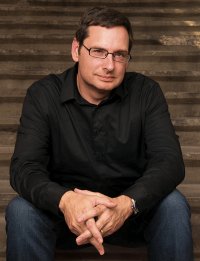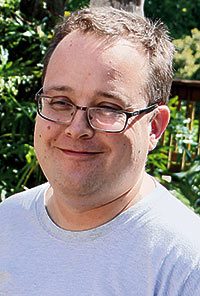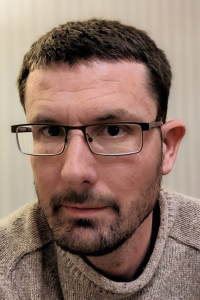Daryl Gregory: The Numinous
 Daryl Jon Gregory was born June 26, 1965 in Illinois, grew up in Darien IL, and attended college at Illinois State University, graduating with a double major in English and Theater. He taught high school for a few years, became a technical writer, and is now a part-time programmer.
Daryl Jon Gregory was born June 26, 1965 in Illinois, grew up in Darien IL, and attended college at Illinois State University, graduating with a double major in English and Theater. He taught high school for a few years, became a technical writer, and is now a part-time programmer.
In 1988 Gregory attended the Clarion workshop, where he wrote ‘‘In the Wheels’’, his first publication, which appeared in F&SF in 1990. Other stories include ‘‘Taking the High Road’’ (1991), ‘‘The Sound of Glass Breaking’’ (1992), ‘‘An Equitable Distribution’’ (1997), ‘‘Free, and Clear’’ (2004), ‘‘The Continuing Adventures of Rocket Boy’’ (2004), Sturgeon Award finalist ‘‘Second Person, Present Tense’’ (2005), ‘‘Gardening at Night’’ (2006), ‘‘Dead Horse Point’’ (2007), ‘‘Unpossible’’ (2007), ‘‘The Illustrated Biography of Lord Grimm’’ (2008), and ‘‘Glass’’ (2008). Some of his short work has been collected in Unpossible and Other Stories (2011). In 2011 Gregory began writing for comics, notably for the Dracula: Company of Monsters and Planet of the Apes series from Boom! Studios.
First novel Pandemonium (2008) was a World Fantasy, Mythopoeic, and Shirley Jackson Award finalist, and won the Crawford award for best first fantasy. Second novel The Devil’s Alphabet (2009) was a Philip K. Dick Award finalist, and zombie novel Raising Stony Mayhall appeared in 2011. His latest novel, Afterparty, is out this month, and Lovecraftian YA Harrison Squared and the Dwellers is forthcoming.
He lives in State College PA with wife Kathy Bieschke and their children Emma and Ian.
Excerpts from the interview:
‘‘I come from hillbilly stock – my ancestors were all kicked out of the Smoky Mountains when they made it a national park in the 1930s, and almost all my relatives still live in Tennessee. The rest of the family grew up in this town called Rocky Branch. My parents moved north for jobs in the ‘60s, and I grew up in Chicago, but we would go ‘home’ (as we called it) for vacation to Tennessee, a couple weeks a year. The Devil’s Alphabet is about me being the northern kid who had all these relatives in the South. I’m an inside/outsider in Rocky Branch. In the novel, there are these mutants who are gigantic and 600 pounds, and some that are ten feet tall and rail thin. It flirts with the stereotypes of the South. My parents read it and said, ‘This is like a lot of the people around here.’ It’s about living in a small town where this weird thing happened ten years before, and people started changing.”
…
‘‘Readers will read something as science fiction if the characters are engaged in the process of science. In fantasy there’s no fiddling with the rules. You pull a sword out of a stone, and that makes you King of England. There’s no, ‘But what if I put a sword into the stone?’ In a science fiction novel, everybody would be trying to figure out how to make more kings by inserting more sharp objects into rocks! A fantasy novel is almost distinguished by not asking those fundamental questions about what is going on. A science fiction novel, no matter what the rules, is always asking those questions. A character in Pandemonium says, ‘We don’t even understand how consciousness works. We know that it’s real, but nobody understands it.’ Just because we don’t know why demons are running around the world by the end of the novel doesn’t mean there’s not some explanation.”
…
‘‘The new book, Afterparty, is about neuroscience and the feeling of the numinous. This is something I’ve toyed around with at various points. There’s a story called ‘Damascus’ where I deal with this, and in every single thing I’ve written there’s this religious flavor that comes from being raised as a Southern Baptist. It just comes like grits in the South: there’s gonna be Jesus imagery in everything I write. Afterparty has ideas I’ve been working on in science fiction short stories that never made it explicitly into a novel before (though weird stuff about identity keeps showing up even in the ostensibly fantasy novels, because that’s what keeps bothering me).
‘‘Over the years, I’ve been reading about how we can study monks who are deeply meditating, Catholic nuns who are praying very deeply, and see the parts of their brain that are lighting up. There are people with temporal lobe epilepsy who have these intensely religious experiences, and they don’t feel like hallucinations. You feel that you’re in contact with something real, like you’re opening up an antenna. A lot of people have occasional experiences of the numinous.
‘‘I’m a materialist, a brain-science kind of guy, so I think these are very sophisticated illusions – just as we believe we have free will and that we have a self. But I was interested in the idea that if you could synthesize this and make it into a drug, maybe you’d be a better person on religion than you are without it. In the book, I’m constantly arguing against myself, in that I tell you it’s a drug, so the reader’s first reaction is, ‘They’re hallucinating this.’ But I still want you to believe in the hallucinated character of Dr. Gloria and have her seem as real as any of the characters in the book, so you feel the loss when she goes away. It’s like the loss you feel for some fictional characters when they die: you know it’s an illusion, at the same time as you feel that real emotion.
‘‘At the end of chapter one and the beginning of chapter two, I tell you she’s an illusion, and I want you to care anyway. Lyda is a better person when she’s with Gloria, and Gloria saves her life a couple of times. When you grow up in a religion like I did, there are some people you believe are better off – become better people – once they’ve ‘found Jesus,’ because of this belief system. Why would you want to take that away from them? In science fiction, of course, we would argue that you need a life without any illusions because that’s the stronger choice, but I wanted to have it both ways in the book. There are a lot of benefits to living with illusions. I still persist in thinking of myself as a self, and a contiguous personality, even when it’s demonstrably false.”
…
‘‘My next project is basically a Lovecraftian YA for Tor. (I think of it as ‘Cthulhu for Kids.’) Before David Hartwell bought it, I had a discussion with a different publisher about, ‘How scary can you be?’ I think what they were afraid of is a parent picking up a book and thinking it’s too scary for their kids. In my book, there’s a knife-wielding guy. The mom is in danger. I was writing the kind of adventure I thought my son would like and that I like to read. I didn’t do a lot of, ‘Let me find a guidebook that would tell me what level of violence is OK.’
‘‘The book is called Harrison Squared and the Dwellers. All the adults are the typical Lovecraftian townspeople where everybody’s in the cult, but some of the teenagers don’t want to be in the cult. It’s basically Innsmouth. Because it’s a teen book, they’re the rebels who are not on board with sacrificing strangers to the Great Unnamed God. That’s why they’re the protagonists. The comparison with me growing up in the Southern Baptist Church is completely incidental!’’






